The Beginner's Guide To Content Marketing Analytics (+ Content Report Template)

Numbers and data analytics aren't the first things that come to mind when you think of content marketing.
Your mind may have gone to familiar ground - writing, creativity, storytelling, and visual design. Analytics and data reporting are scary, unfamiliar disciplines to you.
Sound familiar? Don’t worry, we got you.
In this beginner's guide, we'll show you how learning analytics can help with content creation and marketing strategy and which metrics to pay attention to. Last but not least, we'll show you how to use DashThis to make your content reporting more efficient.
What are content marketing analytics, and how do they help you evaluate content performance?
Content marketing analytics involves measuring and reporting content across different platforms and marketing channels. This includes channels as diverse as social media platforms, email marketing, and search engine optimization (SEO) efforts.
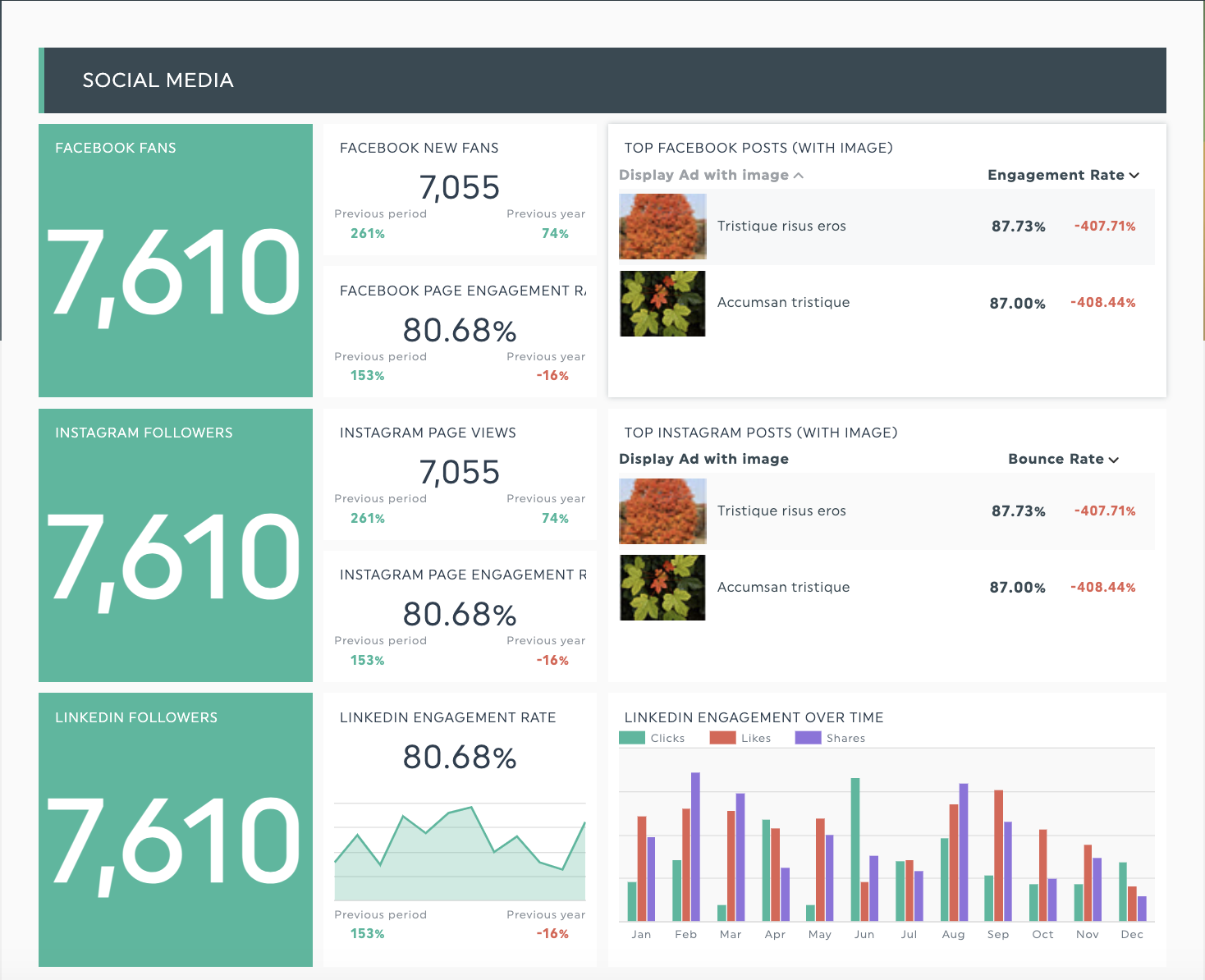
DashThis report shows social media analytics from Facebook, Instagram, and LinkedIn in one chart for easy comparison. Get this social media report with your own data!
And before you stifle another groan at the thought of looking through another boring spreadsheet, content people see the importance of data analytics expertise. According to Contently, half of senior content marketers plan to develop their in-house talent with training or by hiring outside help in 2023.
We know content marketers have tons on their plates and limited resources to pull it all off. Hence, thinking strategically and spending your limited content marketing time well is essential.
Why content marketers benefit from understanding content marketing analytics
Multiple studies show content marketing is an excellent long-term investment for brands because it builds a trusting relationship between brands and consumers, making consumers more likely to purchase from brands they trust.
But how do you know if your content marketing is hitting the mark on quality and effectiveness? That’s where analytics help marketers do their jobs more effectively and stress less.
Help you understand which content pieces do well and why
If you’ve put your heart and soul into a campaign, you’ll want to give credit where credit is due (and be recognized for your efforts) when content performs well.
Referring to data analytics also helps you spot early warning signs your messaging wasn’t relevant to your target audience or customer journey and course correct with actionable insights.
Content marketing analytics helps you confidently answer questions like:
- Does the time and effort we put into in-depth content marketing pieces translate to business results?
- What types of content or content formats do our target audience prefer? Does our audience respond better to listicles or infographics, for instance?
- Is content marketing effective at helping us achieve our business goals? For example, is it helping us to get more people to know our brand on Google search, drive lead generation through free trials, or allow users to get more value from our product?
While this guide focuses on quantitative (numerical) analytics for content, qualitative measures like feedback from sales conversations can also be a powerful source of information on your content marketing effectiveness.
Did a sales prospect mention a particular piece of content when contacting your sales team or during a sales conversation? Make a note of the content pieces they mention. You could also look at your social media channels and note down posts that encourage discussion, praise or constructive comments.
Measure content marketing performance and identify opportunities for improvement
You’re more likely to be successful at content marketing campaigns if you measure content effectiveness, according to a Content Marketing Institute 2023 report.
For instance, top-performing B2B content marketers are more likely to measure content performance effectively. 77% of the respondents who ranked their company’s content marketing efforts as “successful” measure their content’s performance. On the other hand, only 17% of respondents who report disappointing content marketing results measure their content’s performance.
Which makes sense. After all, you’re more likely to know what’s doing well and what isn’t if you allow analytics to guide your initiatives and where you focus your time.
Demonstrate content marketing’s contribution to business ROI
Content marketing is notoriously challenging to attribute results to compared with other digital marketing efforts like pay-per-click ads.
And people in content marketing agree. According to a 2023 report by the content marketing community Superpath, driving business results had over half of the respondents worried.
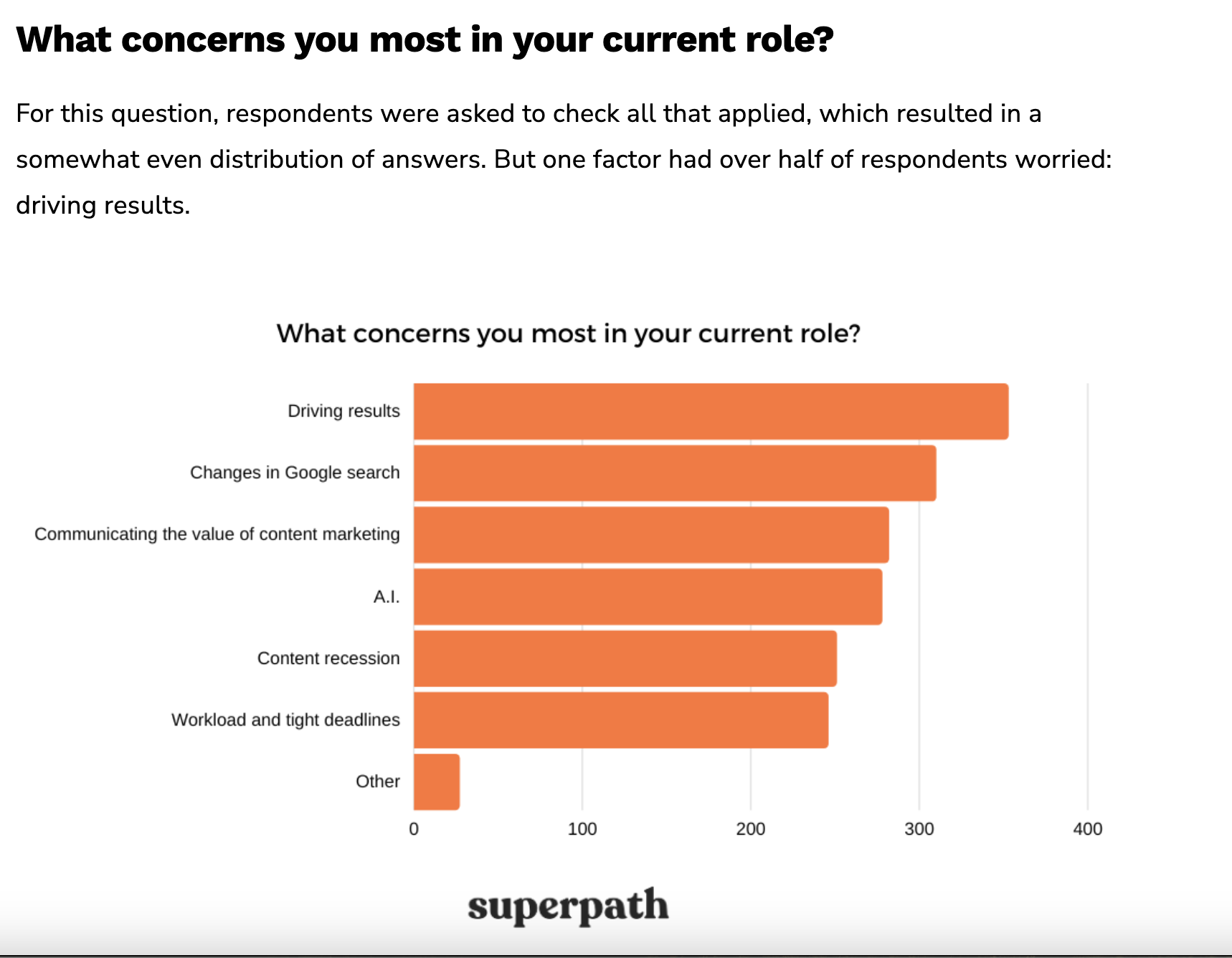
Driving business results took the top spot in a list of concerns by in-house content marketing professionals.
If you want to be seen as someone with expertise in content marketing, now is the time to brush up on your content marketing analytics skills.
Top content marketing analytics metrics for beginners
The primary aim of a content marketing report is to provide data to support a decision or track performance over time. So carefully think through the objective of your report, then select the relevant metrics to support that goal, like:
- Identifying which content to optimize
- Helping your chief marketing officer (CMO) understand how content marketing has performed against other marketing channels
- Preparing a marketing team proposal to ask for more resources to hit your overall marketing goals
For more resources on setting content marketing goals and identifying key performance indicators (KPIs), check out:
Content marketing metrics usually fall into 4 different categories.
Content consumption metrics
These metrics illustrate how many people viewed or consumed your content.
- Page views and organic traffic.
- Impressions
- Downloads
- Time on page
Brand awareness metrics
Are your web pages appearing in branded organic search engine results (SERPS?) Are people talking about your brand on social media? Start with these metrics to measure online brand awareness.
- SEO keyword rankings
- Backlinks
- Reach
- Social media mentions
Engagement metrics
Engagement metrics measure if others are sharing or interacting with your content. Take engagement as a vote of confidence for whether your content is valuable enough for people to share with their audience or engage with.
- Shares/reposts/retweets/comments
- Backlinks
- Bounce rate
- Session duration
- Scroll rate
- Click-through rates
Lead generation and sales metrics
If you want to know whether content marketing makes financial sense or if it drives business ROI, monitoring lead generation metrics are essential.
- Conversion rates across different channels
- Email opt-ins/email subscribers
- Content assisted conversions
- Cost per acquisition
- Revenue generated
How to build a dashboard for fuss-free content marketing insights in minutes with DashThis
Let’s say you’ve onboarded a new SEO and content marketing client. This client prefers structured communication and isn’t familiar with content marketing jargon, so you want to ensure you communicate the results of your content marketing efforts in a structured, easy-to-understand way.
DashThis’s got your back! Here’s how to use DashThis to create a suitable dashboard to report your content marketing analytics.
First, access DashThis by signing up for your 15-day free trial.
Create a new dashboard in DashThis
Many templates are available in DashThis to create a new dashboard in a few clicks, or you can also build your own from scratch.
We’ll use the content marketing report dashboard template (also featured below!), which automatically integrates with Google Analytics, Google Business Profile and social media platforms.
An integration helps you automatically pull KPIs from these platforms into your DashThis report - a massive time-saver when you’ve got multiple tools to reference.
Connect your content marketing analytics tools here with our integrations. Simply log in to your accounts, authorize DashThis to access your data, and DashThis will handle the rest.
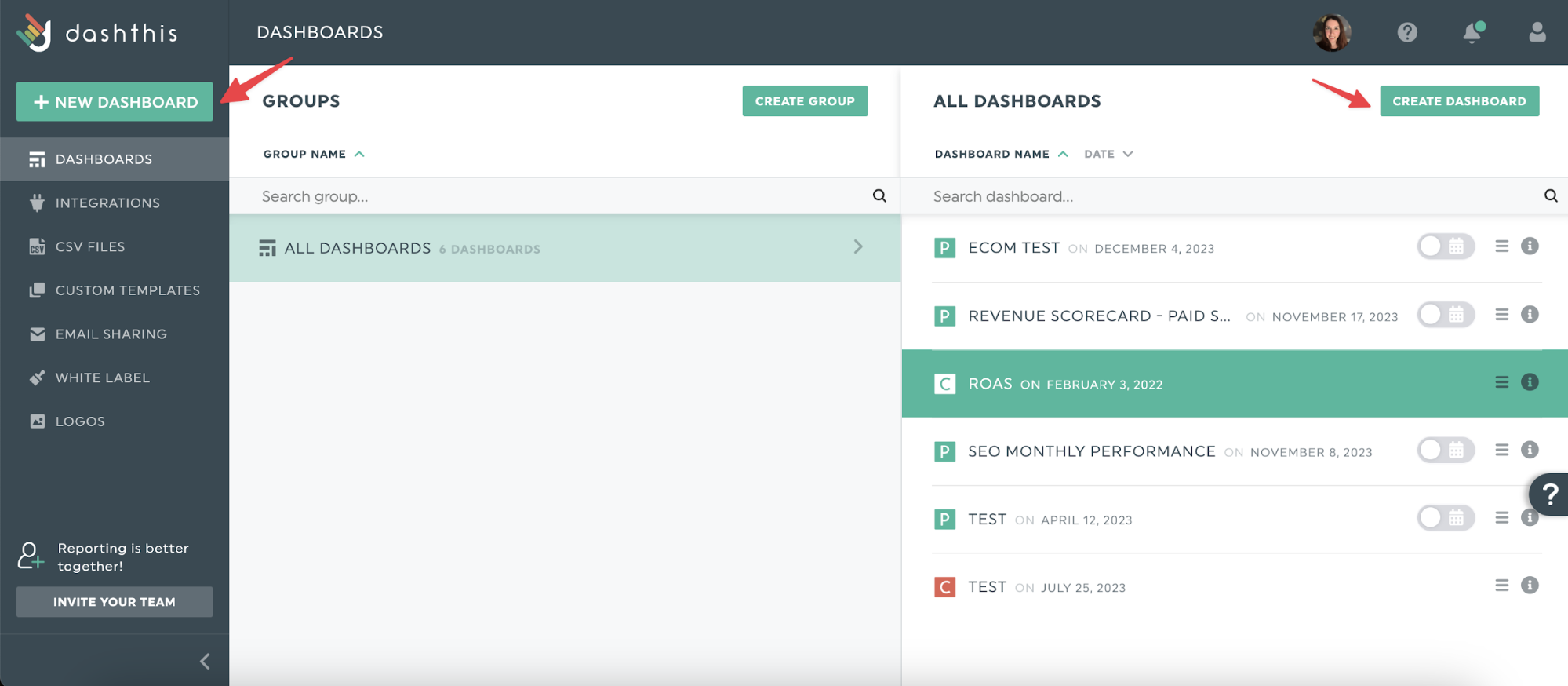
Enter your dashboard preferences.
Give your new dashboard a name, language, currency, and reporting period. For example, you could automatically send a report to track your content KPIs every month.
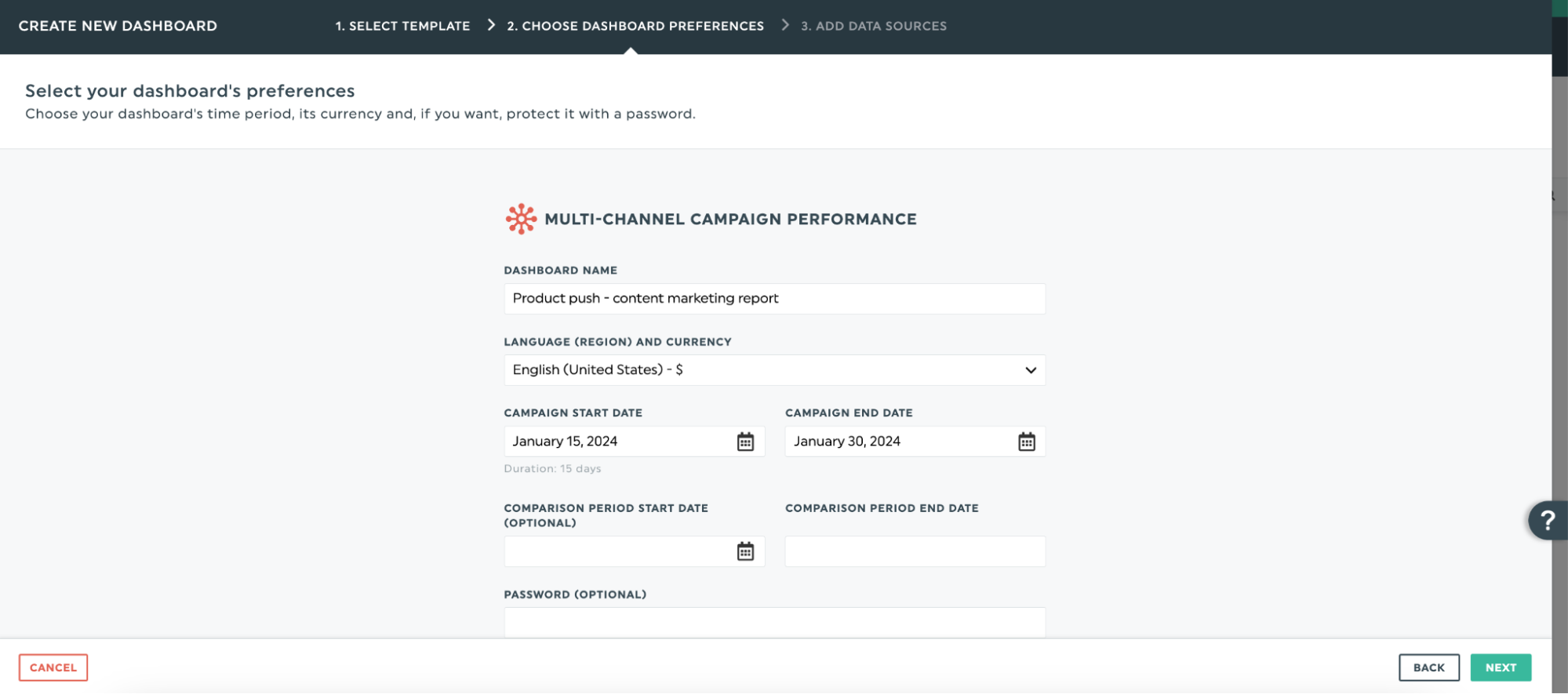
Connect your data sources
Need help to integrate data across way too many content marketing analytics tools? You’re not alone.
Integrating data across multiple platforms came at the top of the list of B2B marketers’ top challenges with measuring content marketing performance, according to a 2023 survey by Content Marketing Institute.
Well, good news: DashThis’s 34+ integrations make it easy to connect all your content marketing apps to get all your data in one place, comparing data across channels or making data-driven decisions more accessible.
Popular integrations for content marketers include:
- SEO, CRM and inbound marketing tools: Ahrefs, SEMRush, Moz, HubSpot
- Web analytics platforms: Google Analytics 4
- Email marketing tools: Mailchimp, Campaign Monitor
- Social media platforms: Facebook, LinkedIn, Instagram, TikTok
We’ve designed our software to make content reporting a breeze, so connect your tools to DashThis and import your data into the dashboard.
Now, you’ve got a dashboard set up, so it’s time to choose the metrics to show and customize how they look.
Customize your dashboard and set up your data visualizations
DashThis has multiple data visualization options to help you tailor your report to your clients' or stakeholders' needs, making it easier for clients to understand your data.
Tap on DashThis’s custom widgets to organize your data and give your clients what they want.
For example, is a client seeking a traffic overview for their strategy meeting? Set up a bar chart to break down your total website traffic by channel over the past 12 months to determine which content marketing channel or referral source brings in the most website visitors.
Or you could compare the conversion rates of different landing pages to see which layout or call to action needs more work for your lead generation campaign.
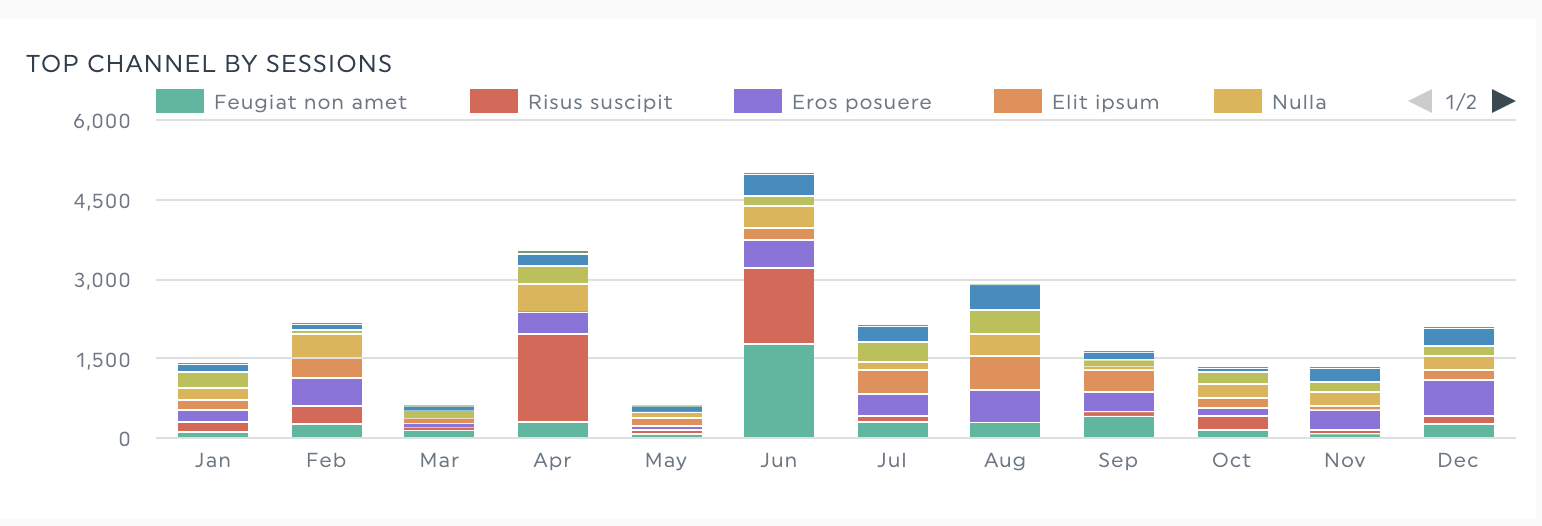
Why not experiment and play around to see what works best for you?
If you’re new to data visualization, don’t fret.
Start with these resources:
- How to visualize data: examples, tips & best practices
- Life in Pictures: Why Web Data Should Be Visual
Build trust with personalized client reporting
You’re almost ready to send your report off, but hang on. Let’s add a few personal touches to customize your dashboard to your client.
Some ways to personalize your report for your client:
- Upload your client’s logo
- Change your dashboard background to fit your client’s colors
- White-label your dashboard to reflect your agency’s branding.
Schedule your report!
Finally, don’t forget to send off your report, especially if you’re presenting a report to a client or key stakeholders.
Set up DashThis to deliver your report every week or month at the same time. You won't have to worry about forgetting to send your report again.

DashThis offers multiple report-sharing options, like
- Automated email dispatch
- A URL link to the report for clients to view online in real-time, perfect for client review meetings
- Export the report as a PDF for your client to view offline.
A content report template for easy multi-channel reporting
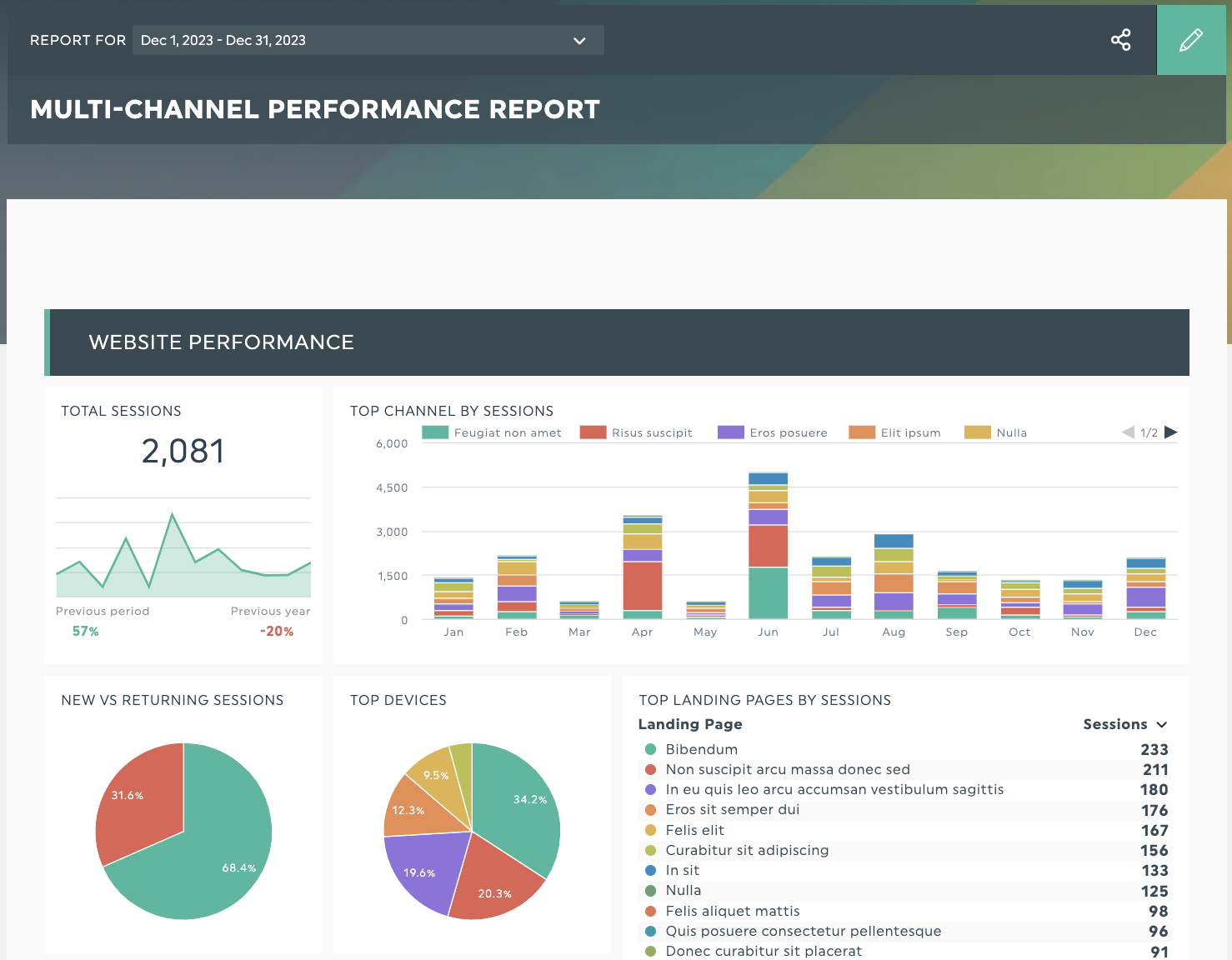
Get your content report template with your own data here!
Built for content marketers who might feel more comfortable staring at words and images than numbers, DashThis’s content report allows you to streamline your reporting process across multiple content marketing analytics tools.
We get that it’s tedious to create a report from scratch, and most people would rather be doing something else.
Using our pre-built content report helps shorten this process from hours to minutes. Free up your time spent on reporting to continue dreaming up content campaigns, researching and writing your next banger of a blog post or dreaming up another creative video concept to electrify your client’s brand.
Or you could take a nap—a great way to spend your time.
Automate your content marketing analytics with DashThis
Content marketing analytics and reporting can be overwhelming and take valuable time out of your day. But DashThis makes it much easier (and faster) to communicate your results, review your analytics for decision-making, etc.
If reporting and analytics are something you need help with, let us help you! Give DashThis a try with our 15-day trial, no credit card required.
You’ll be guided by our world-class customer support team (Don’t just take our word for it; check out what our satisfied customers say here.
Ready to track your content marketing analytics?
Read More
Don’t miss out!
Automate your reports!
Bring all your marketing data into one automated report.
Try dashthis for free

